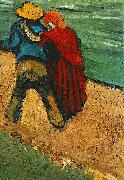
|
Paris Bordone
|
|||
|
|
|||
| Italian 1500-1571 Italian painter and draughtsman. He is best known for his strikingly beautiful depictions of women, both in portraits and in cabinet paintings. He also excelled in rendering monumental architectural settings for narrative, both religious and secular, possibly initiating a genre that would find great currency during the mid-16th century, especially in Venice, France and the Netherlands. His favoured media were oil and fresco, the latter being used on both interiors and faades. Although he was not generally sought after by Venetian patrons during his career, as his art was eclipsed by that of Titian, Paolo Veronese and Jacopo Tintoretto, Bordone was regarded in the mid-16th century as an accomplished artist (Pino; Sansovino). He worked for the moneyed lite of northern Italy and Bavaria, for the royalty of France and Poland, and had works commissioned to be sent to Spain and to Flanders. Despite knowledge of the important patrons for whom he worked, the chronology of Bordones oeuvre is by no means clear. Dating on stylistic grounds is confounded by the diverse sources on which he drew, ranging from the Emilian, Lombard and Venetian to the French and northern European, depending on the patron. Due to the ease with which prints circulated during Bordones career, it is difficult to ascertain whether influences were derived at first hand or from printed images. Such difficulties in assigning dates are further exacerbated by his use of the same figure study for numerous paintings evidently executed decades apart. Reliance on the testimony of Vasari, who interviewed Bordone in 1566, in conjunction with the extant documents, the few signed and dated paintings and, to a lesser extent, period fashion provides only a rough outline of his activity. Due to the lack of agreement among scholars regarding chronology, the following account is based mainly on the documentary evidence. | |||
|
|
|||
|
Two Lovers new16/Paris Bordone-433798.jpg Painting ID:: 41180 |
mk157 c.1525-30 Oil on canvas 95x80cm | ||
|
|
|||
|
Vincent Van Gogh
|
|||
|
|
|||
| Dutch Post-Impressionist Painter, 1853-1890 Vincent Willem van Gogh (30 March 1853 ?C 29 July 1890) was a Dutch Post-Impressionist artist. Some of his paintings are now among the world's best known, most popular and expensive works of art. Van Gogh spent his early adult life working for a firm of art dealers. After a brief spell as a teacher, he became a missionary worker in a very poor mining region. He did not embark upon a career as an artist until 1880. Initially, Van Gogh worked only with sombre colours, until he encountered Impressionism and Neo-Impressionism in Paris. He incorporated their brighter colours and style of painting into a uniquely recognizable style, which was fully developed during the time he spent at Arles, France. He produced more than 2,000 works, including around 900 paintings and 1,100 drawings and sketches, during the last ten years of his life. Most of his best-known works were produced in the final two years of his life, during which time he cut off part of his left ear following a breakdown in his friendship with Paul Gauguin. After this he suffered recurrent bouts of mental illness, which led to his suicide. The central figure in Van Gogh's life was his brother Theo, who continually and selflessly provided financial support. Their lifelong friendship is documented in numerous letters they exchanged from August 1872 onwards. Van Gogh is a pioneer of what came to be known as Expressionism. He had an enormous influence on 20th century art, especially on the Fauves and German Expressionists. | |||
|
|
|||
|
Two Lovers new25/Vincent Van Gogh-383733.jpg Painting ID:: 84708 |
March 1888(1888-03) Medium Oil on canvas Dimensions 32.5 x 23 cm (12.8 x 9.1 in) cyf | ||
|
|
|||
|
Also Buy::. For Following Paintings / Artists / Products, Please Use Our Search Online: |









